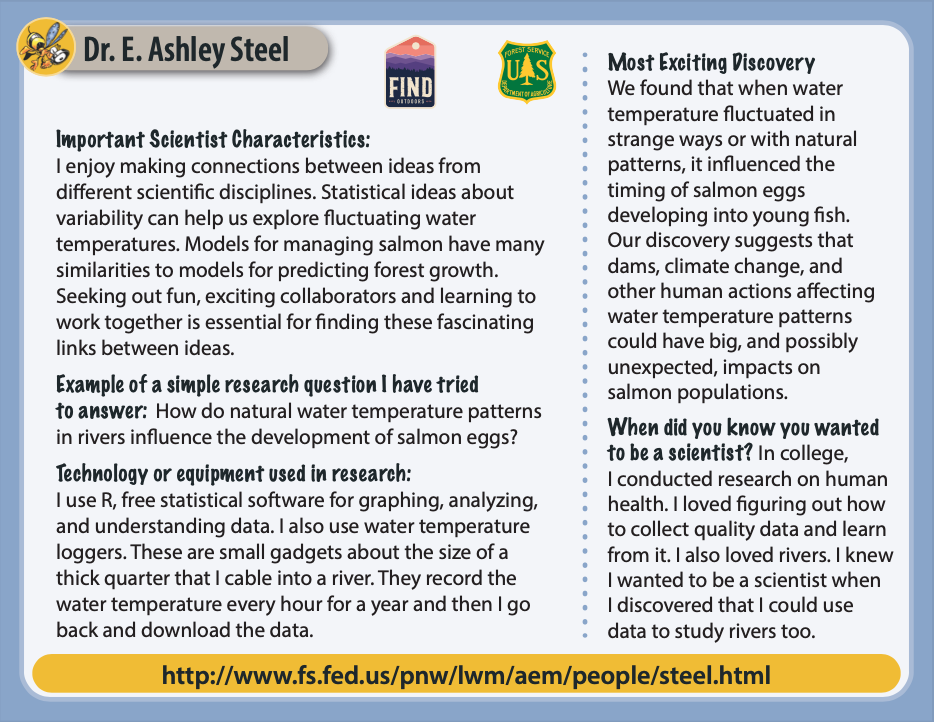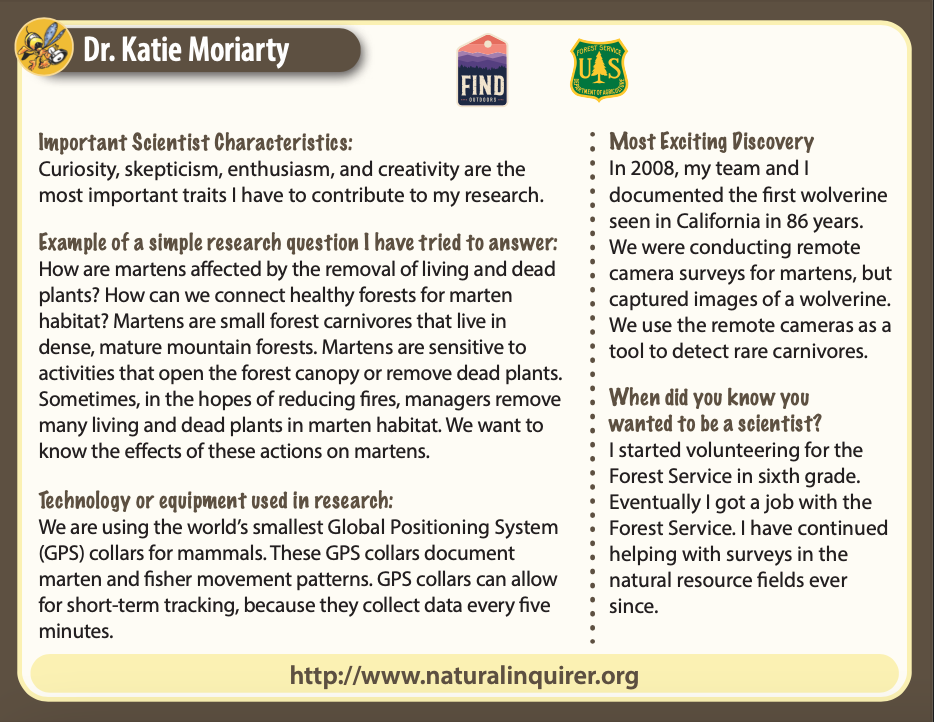Welcome to our website’s resource library, where we offer an extensive collection of free science materials tailored for K-12 students. Dive into a wealth of educational resources including articles, activities, lesson plans, learning modules, and much more. All materials are free to download!
-

 Forests & PlantsWaterWildlife
Forests & PlantsWaterWildlifeE. Ashley Steel, Quantitative Ecologist

- Ph.D., University of Washington-Seattle
- USDA Forest Service Scientist
- A quantitative ecologist uses mathematical skills and ideas to better understand forests, rivers, oceans, fish, wildlife, climate, and more.
- Ph.D., University of Washington-Seattle
- USDA Forest Service Scientist
- A quantitative ecologist uses mathematical skills and ideas to better understand forests, rivers, oceans, fish, wildlife, climate, and more.
-

 Wildlife
WildlifeJanice Reid, Wildlife Biologist

- B.S., University of California, Berkeley
- USDA Forest Service Scientist
- A wildlife biologist studies animal populations and the habitats with which animals associate.
- B.S., University of California, Berkeley
- USDA Forest Service Scientist
- A wildlife biologist studies animal populations and the habitats with which animals associate.
-

 MappingWildlife
MappingWildlifeJenny Rechel, Wildlife Biologist / Geographer

- Ph.D., University of California
- USDA Forest Service Scientist
- As a wildlife biologist and geographer, I focus on studying the effects of disturbance (fire, post-fire erosion, and drought) on bird populations and habitats in the National Forests in southern California.
- Ph.D., University of California
- USDA Forest Service Scientist
- As a wildlife biologist and geographer, I focus on studying the effects of disturbance (fire, post-fire erosion, and drought) on bird populations and habitats in the National Forests in southern California.
-

 Wildlife
WildlifeMarty Raphael, Wildlife Ecologist

- Ph.D., UC Berkeley
- USDA Forest Service Scientist
- I study populations of wildlife and the types of habitat they use to better understand how to conserve species that are at risk.
- Ph.D., UC Berkeley
- USDA Forest Service Scientist
- I study populations of wildlife and the types of habitat they use to better understand how to conserve species that are at risk.
-

 Wildlife
WildlifeCathy Raley, Wildlife Biologist

- M.S., University of Wyoming
- USDA Forest Service Scientist
- As a wildlife biologist, I study birds and mammals in forest ecosystems. I study these animals to understand how they interact with their environment, as well as what these animals need to survive.
- M.S., University of Wyoming
- USDA Forest Service Scientist
- As a wildlife biologist, I study birds and mammals in forest ecosystems. I study these animals to understand how they interact with their environment, as well as what these animals need to survive.
-

 Wildlife
WildlifeRoger W. Perry, Wildlife Biologist

- Ph.D., Oklahoma State University
- USDA Forest Service Scientist
- A wildlife biologist studies wild animals, their populations, and their habitats.
- Ph.D., Oklahoma State University
- USDA Forest Service Scientist
- A wildlife biologist studies wild animals, their populations, and their habitats.
-

 Wildlife
WildlifeBrooke Penaluna, Research Fish Biologist

- Ph.D., Oregon State University
- USDA Forest Service Scientist
- A fish biologist studies fishes and the habitats they occupy to better understand the relationships between fish biology and habitat.
- Ph.D., Oregon State University
- USDA Forest Service Scientist
- A fish biologist studies fishes and the habitats they occupy to better understand the relationships between fish biology and habitat.
-

 Forests & PlantsWildlife
Forests & PlantsWildlifeMs. Yvette Ortega, Ecologist

- University of California, Berkeley
- USDA Forest Service Scientist
- An ecologist studies how plants, animals, and nature’s forces interact.
- University of California, Berkeley
- USDA Forest Service Scientist
- An ecologist studies how plants, animals, and nature’s forces interact.
-

 Forests & PlantsWildlife
Forests & PlantsWildlifeDede Olson, Research Ecologist

- Oregon State University
- USDA Forest Service Scientist
- I study potential threats to animal populations, especially amphibians and reptiles, including disease and habitat alteration from forest management. I also study general ecology such as species distributions, habitat associations, movements, and breeding.
- Oregon State University
- USDA Forest Service Scientist
- I study potential threats to animal populations, especially amphibians and reptiles, including disease and habitat alteration from forest management. I also study general ecology such as species distributions, habitat associations, movements, and breeding.
-

 Wildlife
WildlifeKatie Moriarty, Research Wildlife Biologist

- Ph.D., Oregon State University
- USDA Forest Service Scientist
- A wildlife biologist studies living organisms such as birds, mammals, reptiles, and amphibians. Wildlife biologists also study habitats, life histories, population changes, and movement.
- Ph.D., Oregon State University
- USDA Forest Service Scientist
- A wildlife biologist studies living organisms such as birds, mammals, reptiles, and amphibians. Wildlife biologists also study habitats, life histories, population changes, and movement.



